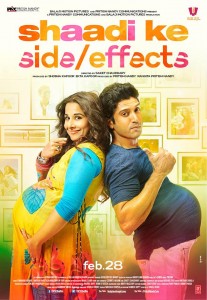 After the success of Pyaar Ke Side Effects, writer-director Saket Chaudhary dives further into relationships by examining the “side effects” of marriage in Shaadi Ke Side Effects. The film stars Farhan Akhtar and Vidya Balan, both of whom have been on quite a roll lately. They say they hadn’t even met, let alone become friends, before the film, but their easy-going chemistry leapt out immediately in the trailers.
After the success of Pyaar Ke Side Effects, writer-director Saket Chaudhary dives further into relationships by examining the “side effects” of marriage in Shaadi Ke Side Effects. The film stars Farhan Akhtar and Vidya Balan, both of whom have been on quite a roll lately. They say they hadn’t even met, let alone become friends, before the film, but their easy-going chemistry leapt out immediately in the trailers.
In summary, Sid and Trisha Roy have grown up into different actors from Pyaar Ke Side Effects and gotten married. Beyond that, there really isn’t much of a plot here. Sid and Trisha have a baby. Sid is not happy, Trisha pretends to be. Sid starts lying to his wife to be happy. It inevitably blows up in his face. They reconcile without actually fixing anything.
Unfortunately, that pretty much is the story. What starts off as a wonderful concept ultimately fizzles — and all but dissolves in the final 20 minutes — because a lack of solid storyline.
But adding to the woes is that the movie is a waste of Vidya Balan’s talent. She and Farhan both do a mighty good job with comedic timing and making what they’re given feel real, even when it’s ridiculous, but she is given far less to work with than he is. Trisha has very little character up until the end of the story when she’s breaking down. She spends most of the runtime as an overprotective mom/demanding wife stereotype with little to no nuance. We don’t even know what Trisha did for a living before quitting to become a full-time mom.
Though it’s understandable the movie might focus more on Sid’s struggles than Trisha’s, the way that it treats Trisha makes you wonder if the filmmaker understands married women like her at all. You’d hope someone making a comedy about marriage would, but I’m not so sure here.
But then this movie really does end up being more about raising a child than having a marriage, especially considering the Roys realize “we are pregnant” in just the second scene. But to great disappointment, their daughter, Milli, isn’t much of a character either. What things does Milli like? We don’t know. How does she feel about mummy and papa, fighting or not? We don’t know that either. We see Milli through several important developments of her young life without developing any feel for her.
Many of the supporting characters — especially Sid’s roommate Manav (Vir Das) and the maid (Ila Arun) — have much greater nuance but flit in for a scene, maybe two, and then flit out again. After several scenes early on, for example, Trisha’s disapproving mom (Rati Agnihotri) totally disappears until a wordless cameo at the very end.
But stepping away from the plot, or lack thereof, several of the gags are quite funny, like when trying-to-sympathize Sid puts a balloon full of water under his shirt to mimic pregnancy. And one-liners like Sid’s after Trisha befriends a male neighbor: “I’m feeling a bit like Sehwag; I played two matches poorly and they’ve replaced me with a younger player.” The film also takes some really funny potshots at overbearing parents who stand around and discuss things like their children’s, ahem, “potty” with a bit too much seriousness.
But the biggest advice on marriage it portrays over a very unnecessary 2 hours, 43 minutes is that you should probably talk to your spouse instead of holding everything in until you implode. A worthwhile point, but it should probably be made more strongly if it’s meant to anchor a story. And the cautions against lying to those you love might ring a little truer if the whole movie didn’t end on one more lie.
Certainly don’t look here if you’re looking for any kind of moral on marriage, or even a plot with a moral that makes sense.
The leads make it bearable to watch, though still not a pleasure when the comedy gags aren’t going. Casting Farhan and Vidya together was a stroke of genius. If only the plot had been smart enough to match.









